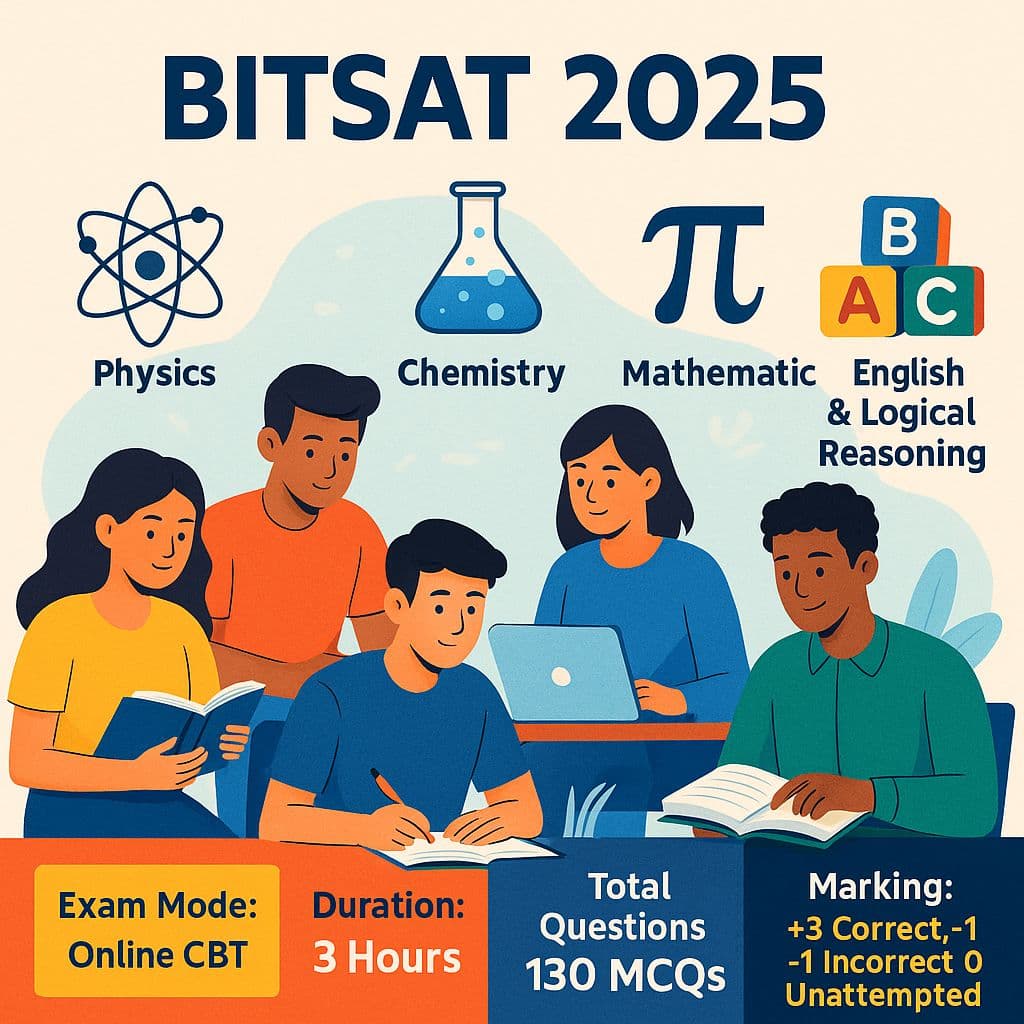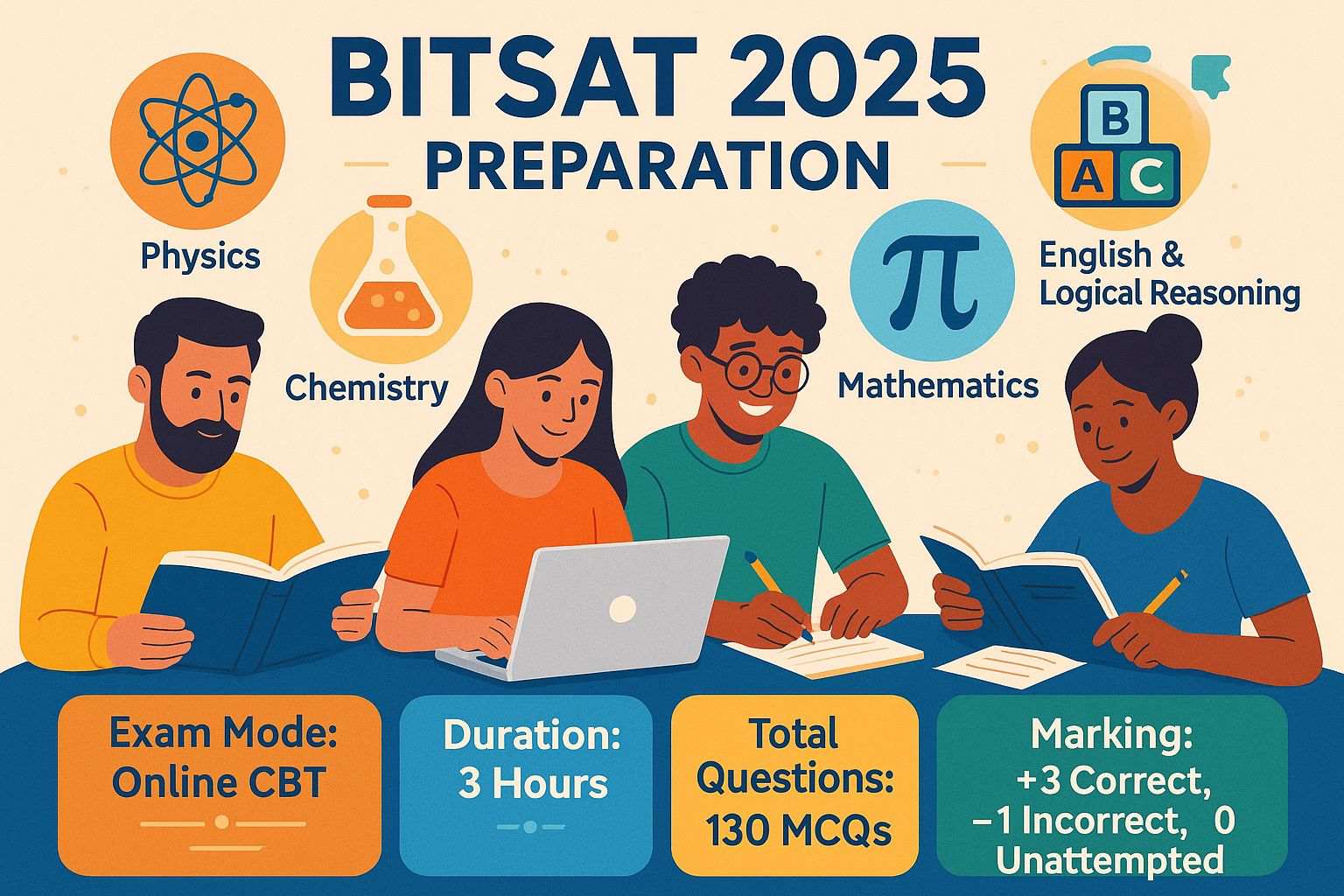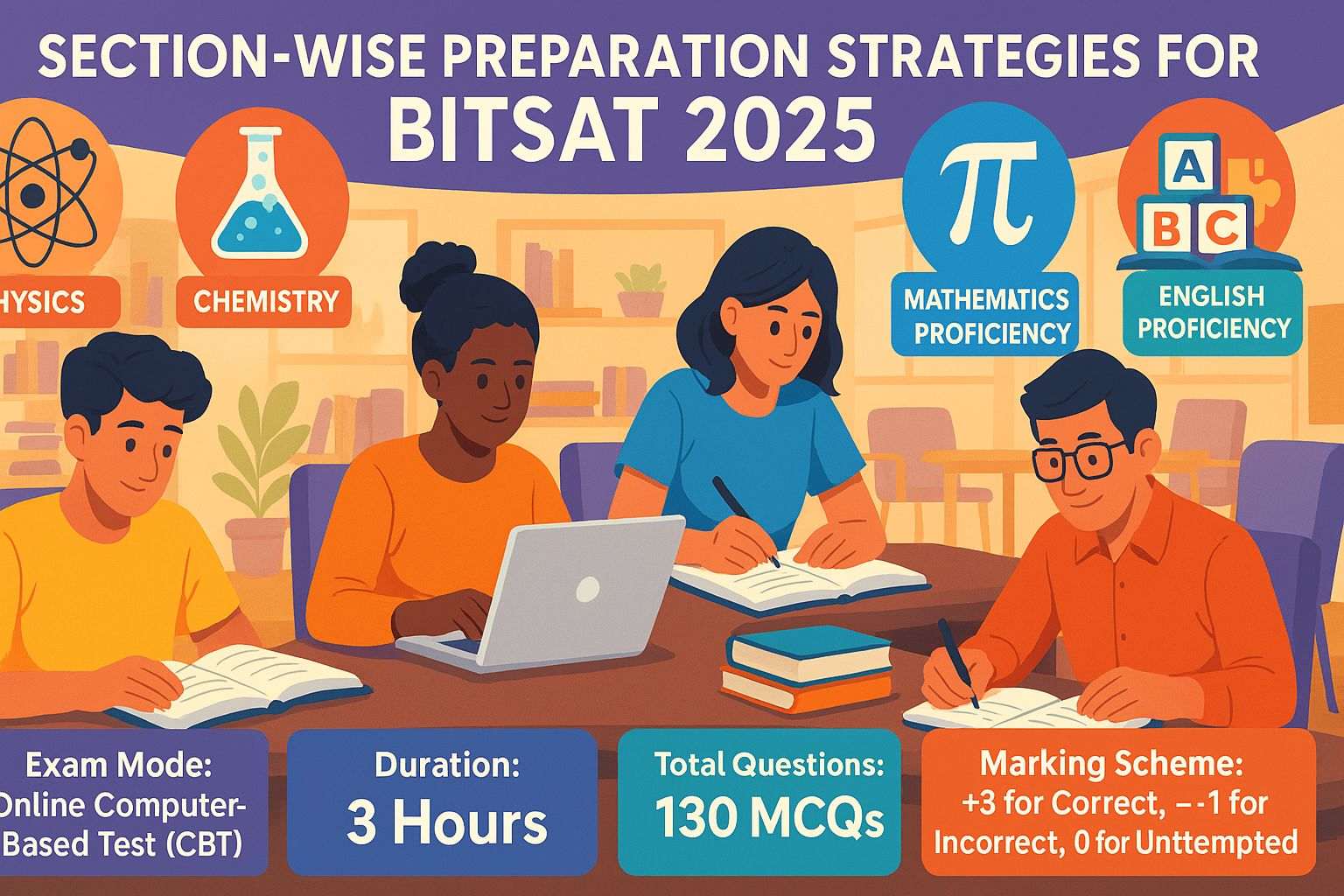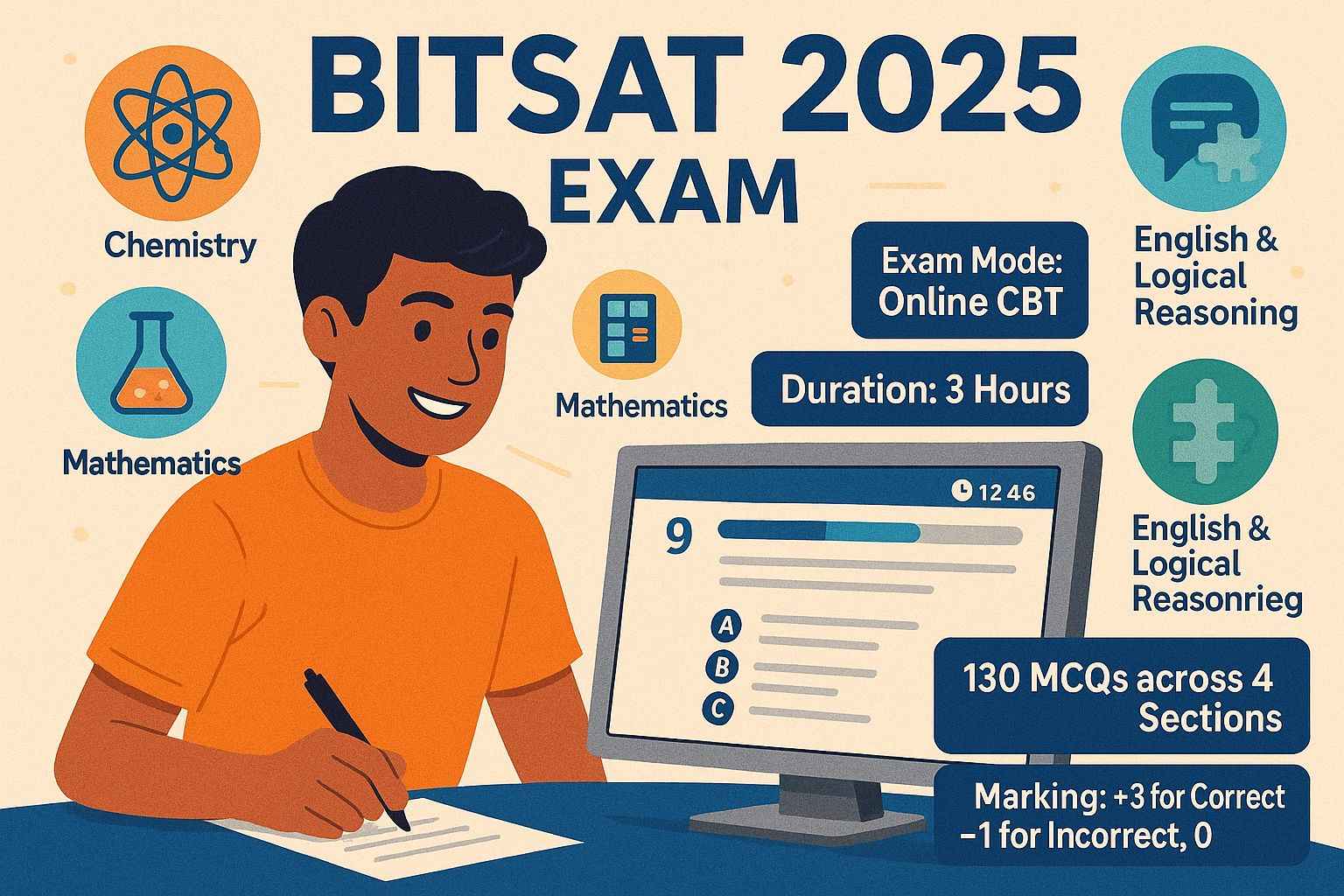Table of Contents
- What You'll Learn in This Guide:
- Introduction to BITSAT
- Understanding the Exam Pattern
- Creating a Comprehensive Study Plan
- Section-Wise Preparation Strategies
- Why Mock Tests Are a Game-Changer for BITSAT Prep
- Time Management Tips for BITSAT Success
- Expert Tips & Tricks for Exam Success
- BITSAT Exam Day Tips: Your Guide to Acing the Big Day
- FAQs
- Take the First Step Towards BITSAT Success
BITSAT Preparation 2025: Comprehensive Guide for Engineering Aspirants
Pratham Jiwnani
5/10/2025

BITSAT Preparation 2025: Comprehensive Guide for Engineering Aspirants
Dreaming of joining BITS Pilani, Goa, or Hyderabad?
Cracking BITSAT 2025 might seem like a giant leap, but it’s absolutely within your reach with the right strategy!
This isn’t just another exam—it’s a race against time, with a tricky pattern and a massive syllabus to tackle. Feeling a little overwhelmed? Don’t sweat it! In this guide, we’ll walk you through everything—from foolproof study plans and section-wise hacks to expert tips that work.
Ready to ace BITSAT and turn that dream into reality? Let’s dive in and get you closer to Mastering BITSAT Preparation 2025!
What You'll Learn in This Guide:
- An overview of the BITSAT exam pattern
- How to create a personalized study plan
- Section-wise preparation strategies for Physics, Chemistry, Mathematics, English Proficiency, and Logical Reasoning
- The importance of mock tests and time management tips
- Practical expert advice to stay ahead of the competition
- Resources to optimize your study efforts efficiently
Introduction to BITSAT
The BITS Admission Test (BITSAT) is an online exam conducted annually for admission to undergraduate programs at BITS campuses. Known for its competitive nature, BITSAT evaluates candidates across five sections:
- Physics
- Chemistry
- Mathematics (or Biology for B.Pharm)
- English Proficiency
- Logical Reasoning

All You Need to Know About BITSAT 2025
If you're gearing up for BITSAT 2025, here's a quick overview to get you started:
- Exam Mode: It’s an online, computer-based test convenient for tech-savvy students like you!
- Duration: You’ll have 3 hours to complete it, so time management is key.
- Total Questions: 130 multiple-choice questions spread across 4 sections—so brush up on all your basics!
- Marking Scheme:
- You score +3 points for every correct answer.
- Lose -1 point for wrong answers (so guess wisely!).
- No penalty for unattempted questions—so skip it if you’re unsure.
Understanding the Exam Pattern
Before diving into preparation, familiarize yourself with the BITSAT structure to allocate your preparation time effectively.
| Section | Number of Questions | Marks Per Question | Focus Areas |
|---|---|---|---|
| Physics | 30 | +3 / -1 | Mechanics, Modern Physics, Current Elec. |
| Chemistry | 30 | +3 / -1 | Organic, Physical, NCERT concepts |
| Mathematics/Biology | 40 | +3 / -1 | Algebra, Calculus, Geometry, Trigonometry |
| English Proficiency | 10 | +3 / -1 | Vocabulary, Grammar, Reading Comprehension |
| Logical Reasoning | 20 | +3 / -1 | Analytical Thinking and Diagram Puzzles |
Bonus:
Did you know BITSAT gives you a chance to score extra marks? If you finish all the questions early, you can unlock 12 bonus questions—4 each from Physics, Chemistry, and Math/Bio. But here's the catch: only go for it if you're confident about your answers. Ready to boost your score? Let's ace it!
Creating a Comprehensive Study Plan
Good preparation requires a solid plan. Here’s how to get started:
Know the Syllabus
Focus on high-weightage topics:
- Physics: Mechanics, Thermodynamics, Electromagnetism
- Chemistry: Organic Reactions, Chemical Equilibrium
- Math: Calculus, Probability, Vectors
Set Weekly Goals
Break the syllabus into chunks. Example: Week 1 = “Thermodynamics + Algebra.”
Daily Study Routine
- Math/Physics: 3 hrs
- Chemistry: 2 hrs
- English/Reasoning: 1 hr
- Practice/Mock Tests: 1+ hr
Use 45-minute study blocks with breaks.
Revise Smartly
Dedicate the last 4-6 weeks to revisions and mock exams. Spot and fix weak areas.
- Stay Organized
Keep materials labeled and in one place. Use a simple study schedule.
- Active Study
Don’t just read—solve questions, teach others, and discuss for better retention.
Section-Wise Preparation Strategies

1. Physics
Physics can be a high-scoring subject if you approach it the right way. It’s all about understanding and applying concepts smartly to solve problems. Let’s break it down for you:
Where to Start:
- Begin with the NCERT textbooks. These are your go-to resources for building a solid foundation, especially since many competitive exams are based on them.
- Need more clarity? Check out H.C. Verma’s *Concepts of Physics*. It’s fantastic for understanding concepts and sharpening your problem-solving skills.
- D.C. Pandey’s series is excellent for practicing numerical and advanced topics. It’s packed with practical examples and exercises.
Key Tips for Success:
- Focus on mechanics first. It’s the backbone of Physics. Topics like kinematics, laws of motion, and work-energy-power are super important. Mastering these will make other concepts easier to tackle.
- Don’t skip rotational dynamics and thermodynamics—they’re favorites in exams, blending theory and numerical methods perfectly.
- Speed-solving matters! Practice solving questions quickly and efficiently, especially for topics like electromagnetism and modern physics. Use past years' papers to get familiar with the questions that pop up.
Use tools like PhET Interactive Simulations for tricky concepts. Visualizing topics like wave optics or fluid mechanics can make them easier to grasp.
Why It Works:
Follow this structured approach, and Physics won’t just feel manageable—it’ll be your strongest subject. The secret is building a clear foundation, practicing consistently, and not shying away from simulations or online tools to make complex ideas click.
2. Chemistry
Chemistry is often considered one of the most scoring sections in competitive exams, and it’s broken down into three main parts: Physical, Organic, and Inorganic Chemistry. Each one needs a slightly different prep approach, so let’s dive in.
Key Resources to Ace Chemistry:
- NCERT textbooks: These are your go-to for all three sections. They’re concise, accurate, and perfectly aligned with most exam syllabi. Seriously, don’t skip these.
- Organic Chemistry: If you want to master reaction mechanisms and functional groups, you can’t go wrong with Morrison and Boyd. It’s detailed and super helpful.
- Physical Chemistry: Grab P. Bahadur’s Numerical Chemistry for hardcore problem-solving practice. It’s great for building confidence with numerical questions.
- Inorganic Chemistry: For a deeper understanding of periodic trends, coordination compounds, and chemical bonding, check out J.D. Lee’s Concise Inorganic Chemistry. It’s a classic for a reason.
Top Tips to Boost Your Chemistry Prep:
- Physical Chemistry: Practice formulas and solve numerical problems daily, especially topics like kinetics, equilibrium, and thermodynamics. Consistency is key.
- Organic Chemistry: Focus on understanding reaction mechanisms, not just memorizing. Practice key reactions, named reactions, and stereochemistry—everyday exam favorites.
- Inorganic Chemistry: Using mnemonics to memorize periodic trends, reactivity patterns, and exceptions. Prioritize coordination chemistry and bonding.
Master Chemistry with smart practice, focus on the essentials, and stay consistent!
3. Mathematics
Mathematics can be one of the trickiest yet most rewarding subjects, especially if you're preparing for competitive exams. It’s all about practice, speed, and accuracy—yes, consistent effort is the key to achieving it.
Key Topics to Focus On:
- Calculus: This makes up about 30% of most competitive exams. Focus on differentiation, integration, limits, and applications of derivatives—they’re the big scorers!
- Algebra: Get comfortable with matrices, determinants, and quadratic equations. These are frequent visitors in exams and great for boosting your score.
- Coordinate Geometry: Master straight lines, circles, and parabolas. These concepts are not just easy to learn but also high-yielding in exams.
- Probability & Statistics: Work on probability distributions and basics like mean and standard deviation. These often pop up in tricky but manageable questions.
- Trigonometry: Know your identities, properties of triangles, and inverse trigonometric functions inside-out. They’re fundamental for problem-solving.
Pro Tips to Skyrocket Your Prep:
- Use trusted books like R.D. Sharma or Arihant’s Skill in Mathematics for concepts and practice.
- Make a formula sheet and review it daily to save time.
- Practice solving problems with a timer—speed matters! Take online mock tests on platforms like Crackit BITSAT Mock Test.
- Learn shortcuts and mental math for quick problem-solving.
Stick to the basics, practice regularly, and focus on strategies. You’ve got this!
4. English Proficiency
English Proficiency might not always get the attention it deserves, but trust me, it can be a total game-changer for your exams. It’s all about testing your vocabulary, grammar, and reading comprehension skills—so let’s break it down.
What to Focus On:
- Boost Your Vocabulary:
Want to level up your word power? Try apps like Quizlet, Anki, or even the classic Word Power Made Easy. Make it a habit to learn 10-15 new words every day and use them in your writing or conversations. The key? Consistent practice and revision.
- Master Grammar:
Strong grammar is non-negotiable. Pick up Wren and Martin's High School Grammar and Composition—it’s a classic for a reason. To nail this section, focus on areas like error spotting, improving sentences, and cloze tests.
- Tackle Reading Comprehension:
Practice makes perfect here. Aim to solve 3-5 comprehension passages daily. Tools like Spreeder can help you read faster and more accurately, which is a huge plus under time pressure.
Quick Tips for Success:
- Start reading daily. Newspapers, editorials, blogs—pick what interests you. It’s great for improving both vocabulary and comprehension.
- Prioritize error correction questions—they’re simple, high-scoring, and a great confidence booster.
- Don’t skip mock tests! They're the best way to get familiar with the question patterns and build that exam-day confidence.
Make English Proficiency your secret weapon. With a little effort every day, it won’t just help you ace your exams—it'll give you a real edge in everything from academics to your career.
5. Logical Reasoning
Logical Reasoning is all about testing your problem-solving and critical-thinking skills. The best part? You can turn it into a scoring section for any exam with the right practice.
Resources to Get You Started:
- R.S. Aggarwal’s A Modern Approach to Logical Reasoning: This classic book is packed with everything from puzzles and series to analytical reasoning. Perfect for beginners!
- Arun Sharma’s Logical Reasoning for CAT: If you’re ready to level up, this book dives deeper into advanced logical and analytical reasoning concepts, ideal for competitive exams.
Why Mock Tests Are a Game-Changer for BITSAT Prep
Mock tests are your secret weapon if you're serious about acing BITSAT. They’re not just another practice tool—they’re essential for success. Let’s dive into why they matter and how you can use them to level up your prep.
Why Should You Take Mock Tests for BITSAT?
- Get Comfortable with the Real Exam
Mock tests mimic the actual BITSAT experience, from the 3-hour time crunch to the question pattern. The more you practice in this environment, the less nervous you'll feel on exam day. No surprises, just confidence.
- Spot Your Weak Spots
Mock tests are like a magnifying glass for your prep. They show you where you struggle—whether it's running out of time on Math or tripping over inorganic chemistry. Once you know your problem areas, you can focus your energy on fixing them.
- Boost Focus and Stamina
BITSAT is a marathon, not a sprint. Sitting through a 3-hour test takes mental energy and focus. Regular mock tests train your mind to stay sharp and focused from start to finish, so you don’t lose steam halfway through.
- Improve Speed and Accuracy
Mock tests help you pinpoint careless mistakes and gaps in understanding. Over time, you'll get better at avoiding errors and answering faster, which is key for scoring big in BITSAT.
So, if you’re prepping for BITSAT, don’t skip mock tests. They’re your best ally for building confidence, fixing mistakes, and walking into the exam hall fully prepared. Start practicing today, and watch your scores improve!
BITSAT Mock Test Strategy: Your Step-by-Step Guide to Success
Preparing for BITSAT? Mock tests are your ultimate weapon, and here’s how you can make them work for you:
Start Early: Don't wait until the last minute! Start taking mock tests at least 2–3 months before the exam. Begin with 1–2 tests per week, then ramp it up as the big day gets closer.
Review Every Test Like a Pro: This is where the magic happens. Spend as much time analyzing your test as you did taking it. Look closely at:
- The questions you got wrong or skipped.
- How much time do you spend on each section?
- Topics where your accuracy is shaky.
Tackle Weak Areas: Use your test analysis to zero in on weak points. Didn’t do well in Math? Revise those concepts. Struggling with Physics? Solve targeted practice problems. Break it down into small sections and conquer them one by one.
Practice Like It’s the Real Exam: Take your mock tests in a quiet, distraction-free space, ideally at the same time as your actual exam slot. This gets your mind and body into the rhythm of test day.
Try Adaptive Mock Tests: Want to mimic the real BITSAT experience? Use adaptive mock tests, like those offered by CrackIT Test Series. They mirror the difficulty level and question patterns of BITSAT, so you’ll know exactly what to expect.
Mock tests aren’t just practice—they’re your roadmap. Review, refine, and repeat, and you’ll walk into that exam room with confidence.
Recommended Platforms for BITSAT Mock Tests:
- CrackIT Test Series:CrackIT provides high-quality mock tests tailored for BITSAT. The test series includes detailed performance analytics, adaptive question sets, and a real exam-like interface. Start practising with CrackIT here: Access Test Series.
For a detailed breakdown of how to approach mock tests and maximize your BITSAT score, check out CrackIT’s blog on the Comprehensive BITSAT Mock Test Strategy.
Mock tests are your ultimate tool for success—but only if you approach them strategically. Start practicing today, and get one step closer to acing the BITSAT!
Time Management Tips for BITSAT Success
Looking to ace BITSAT? Managing your time effectively is the secret sauce! Here’s how you can balance speed with accuracy to maximize your score.
How to Divide Your Time:
- Physics & Chemistry: Spend around 60-70 minutes here. Don’t get stuck—keep the momentum going.
- Mathematics/Biology: Dedicate about 80 minutes. These carry heavy weight, so focus here.
- Logical Reasoning & English: Wrap this up in 30-40 minutes. These sections are typically quicker to solve.
Time-Saving Hacks You Need to Know:
- Start with the **easiest questions**—build confidence and gain momentum.
- Found a tough or time-consuming question? Skip it for now and come back later.
- When in doubt, use elimination strategies to narrow down answer choices.
Remember, BITSAT is as much about strategy as it is about knowledge. Practice these time management tips during mock tests to get into the groove!
Expert Tips & Tricks for Exam Success

- Practice Past Exam Papers
Use last year’s papers to get familiar with the exam format and common questions. Set aside time to simulate real exam conditions and focus on improving time management and confidence.
- Focus on Weak Areas
Identify your toughest topics using mock tests or past grades. Adjust your study plan to spend more time on these areas, and use resources like tutorials or a tutor to improve. Consistency is key—keep practicing and track your progress.
- Ask for Feedback
Get feedback from teachers, mentors, or study buddies to spot mistakes and improve. Write down suggestions and make them part of your study plan. Regular feedback can boost your performance.
- Build Mental Stamina
Stay focused under pressure by practicing mindfulness, taking breaks, and getting enough sleep. Techniques like deep breathing or meditation can help reduce stress and improve memory.
BITSAT Exam Day Tips: Your Guide to Acing the Big Day
Feeling nervous about BITSAT? Don’t worry—you’re not alone, and we’re here to help! Preparing for the exam isn’t just about hitting the books; how you handle test day can make or break your performance. So, let’s talk about some easy, practical tips to help you stay calm, focused, and ready to crush it. Keep reading for everything you need to know to make your BITSAT experience a success!
- Get a good night’s sleep: Seriously, don’t pull an all-nighter. Aim for 7-8 hours of solid sleep the night before. A rested brain = better focus.
- Fuel up with a healthy breakfast: Don’t skip it! A balanced meal in the morning will give your brain the energy it needs to perform at its best.
- Arrive early: Plan to be at the exam center at least 30 minutes ahead of time. This gives you enough breathing room to settle in, find your seat, and relax.
- Read the instructions: Before diving in, take a moment to read all the instructions carefully. It’s an easy way to avoid silly mistakes.
- Tackle easy questions first: Start with questions you know—get those quick wins. It’ll boost your confidence and save time for tougher ones.
- Keep track of time: Don’t get stuck on one question for too long. Set a pace and move through the sections steadily.
- Don’t panic over tough questions: If you hit a tricky one, stay calm. Move on, and come back to it later if you have time.
- Use the tools provided: Whether it’s scratch paper or a calculator, make the most of what’s available to simplify problems.
- Double-check your answers: If time allows, review your answers before submitting. Catching small mistakes can make a big difference in your score!
Remember, test day is all about staying calm, focused, and confident. You’ve put in the work—now it’s time to show what you’ve got. Best of luck with your BITSAT!
By combining these strategies, you’ll feel more prepared, confident, and ready to perform at your best on exam day. Remember, it’s not just about working hard—it’s about working smart with the right tools and techniques that fit your style.
Leverage CrackIT's Premium Resources
CrackIT doesn't just offer test series. They provide tailored study plans, analytics, and mentorship from previous BITSAT toppers. Perfect for laser-focused guidance.
FAQs
Q1. Is BITSAT tougher than JEE Mains?
It depends on your strengths. BITSAT is a speed-based exam, requiring you to solve a high number of questions in a limited time, which tests your ability to apply concepts quickly. On the other hand, JEE Mains is conceptually more challenging, focusing on problem-solving and understanding of core concepts in depth. Students often find JEE Mains tougher in terms of conceptual difficulty, while BITSAT challenges lie in time management and speed.
Q2. When should I start mock tests?
You should ideally begin mock tests after covering 60-70% of your syllabus. Start with section-wise mock tests to gain confidence in individual subjects, focusing on areas where you’re weaker. Once you’ve strengthened these sections, move on to full-length mock tests to simulate the actual exam environment and improve your time management skills.
Q3. What's the best way to handle negative marking?
Negative marking can be tricky, so avoid blind guessing. If you’re unsure about an answer, try to eliminate at least two options based on logic or partial knowledge. If you can’t confidently narrow it down, it’s better to skip the question rather than risk losing marks unnecessarily. Practice this strategy during your mock tests to refine your approach.
Q4. How many hours should I study daily for BITSAT?
Study hours vary from person to person, but generally, 6-8 focused hours daily should be sufficient. Divide your time between learning concepts, practicing problems, and taking mock tests. Make sure to allocate time for all three sections—Physics, Chemistry, and Mathematics, along with English and Logical Reasoning, which are equally important in BITSAT.
Q5. How important is English and Logical Reasoning in BITSAT?
English and Logical Reasoning contribute 25 marks in BITSAT, and they can make a significant difference in your overall score. While the questions may seem relatively straightforward, they are often the deciding factor for many students. Regularly practice grammar, vocabulary, and logical reasoning questions to score well in this section.
Q6. Are NCERT books enough for BITSAT preparation?
NCERT books are a great starting point, especially for Chemistry, as most questions are directly based on NCERT concepts. However, for Mathematics and Physics, you may need additional reference books like HC Verma or past BITSAT mock papers to practice higher-level problems and improve your speed.
Q7. How many mock tests should I take before the actual exam?
Aim to take at least 10-15 full-length mock tests before the actual BITSAT exam. Mock tests help you familiarize yourself with the exam pattern, improve time management, and identify weak areas for improvement. Analyze your performance after every test and adjust your study plan accordingly.
Take the First Step Towards BITSAT Success
With discipline, strategic preparation, and consistent practice, cracking BITSAT is well within reach. Use these actionable strategies to maximize your potential and keep stress in check.
Remember, your goal isn't perfection; it’s progress. Be consistent, use the right resources (like CrackIT), and believe in yourself.
Wishing you the very best for BITSAT 2025!
Categories
Join the Discussion
0 comments